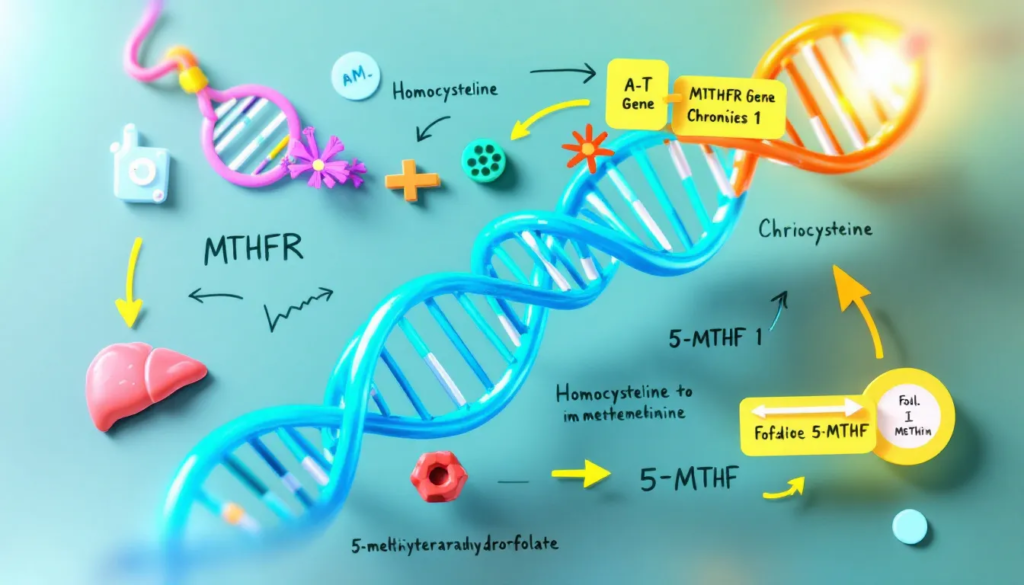MTHFR deficiency impacts how your body processes homocysteine, potentially leading to health issues. In this article, you’ll learn what MTHFR deficiency is, its symptoms, and how to diagnose and treat it.
Key Takeaways
MTHFR deficiency, caused by genetic mutations, leads to elevated homocysteine levels, which can result in severe health issues, including cognitive decline and reproductive complications.
Diagnosis of MTHFR deficiency requires blood tests to measure homocysteine and methionine levels, alongside genetic testing to identify specific mutations.
Management of MTHFR deficiency involves dietary supplementation with folic acid, lifestyle modifications, and, if necessary, medications to help lower homocysteine levels and mitigate associated risks.
What is MTHFR Deficiency?

MTHFR stands for methylenetetrahydrofolate reductase mthfr, an enzyme crucial for processing amino acids, specifically homocysteine. The MTHFR gene instructs the body on producing the MTHFR protein, which is essential for folate metabolism. This enzyme converts homocysteine into methionine, an important amino acid necessary for various bodily functions. When the MTHFR enzyme is deficient or dysfunctional, homocysteine levels can rise, leading to hyperhomocysteinemia and subsequent health issues.
MTHFR deficiency can vary in severity. Some individuals may experience severe methylenetetrahydrofolate reductase deficiency, which can lead to significant health problems such as developmental delays and osteoporosis. Understanding this genetic mutation and its impact on the body is the first step towards managing its effects.
Symptoms of MTHFR Deficiency

The symptoms of MTHFR deficiency are diverse, often impacting cognitive and mental health. Many individuals with this condition experience cognitive decline, affecting their memory and learning abilities. Research has also linked MTHFR gene mutations to various mental health disorders, including depression and dementia. This connection underscores the importance of addressing MTHFR deficiency to maintain mental well-being.
Reproductive health can also be affected by MTHFR deficiency. Women with this genetic mutation may face recurrent pregnancy loss, indicating a potential risk for reproductive complications. Recognizing and addressing these symptoms through appropriate testing and treatment is crucial for those affected.
Causes and Risk Factors
MTHFR deficiency is primarily caused by genetic mutations in the MTHFR gene, which impair enzyme function and result in elevated homocysteine levels, especially when folate intake is insufficient. The 677C>T mutation in the MTHFR gene is one of the most common mthfr gene mutation leading to a less active enzyme and higher homocysteine concentrations.
The prevalence of MTHFR gene variants and the mthfr gene variant of the MTHFR gene and mthfr genes varies among populations. For instance, the thermolabile variant of the MTHFR gene is found in more than a quarter of Hispanic individuals and about 10-15% of North American Caucasians. Understanding these genetic variations and their distribution can help identify those at risk and guide appropriate interventions.
Diagnosing MTHFR Deficiency
Diagnosing MTHFR deficiency typically begins with a thorough review of the patient’s medical history, symptoms, and a physical examination. Ruling out other potential causes of elevated homocysteine levels ensures an accurate diagnosis.
A comprehensive blood test is often conducted to measure homocysteine and methionine levels, providing critical insights into the patient’s metabolic state.
Blood Tests
Blood tests play a vital role in diagnosing MTHFR deficiency by measuring homocysteine levels. Elevated homocysteine levels can indicate a deficiency, prompting further investigation. This test is a straightforward method to assess homocysteine concentrations and detect potential issues early on.
Genetic testing for MTHFR also involves analyzing blood samples to identify specific gene mutations and genetic tests. Examining these samples enables healthcare professionals to pinpoint the MTHFR gene mutations, facilitating a more targeted and effective treatment approach.
Genetic Testing
Genetic testing is a crucial component of diagnosing MTHFR deficiency. The common types of MTHFR gene mutations, such as C677T and A1298C, are typically identified through these tests. Genetic testing helps individuals determine if they carry these mutations and understand their risk factors better.
Such testing is particularly recommended for individuals with a family history of MTHFR deficiency or those exhibiting symptoms related to the condition. Identifying these mthfr mutation early can lead to more proactive management and improved health outcomes through mthfr polymorphism testing.
Treatment Options for MTHFR Deficiency

Effective management of MTHFR deficiency is essential to mitigate the associated health risks. Treatment options range from dietary supplements to lifestyle modifications and medications. Folic acid supplementation is often recommended to support proper folate metabolism and prevent neural tube defects in pregnant women however folic acid is a folate pathway inhibitor and should be avoided in place of real folate or folinic acid.
Lifestyle changes, such as increasing dietary intake of folate-rich foods and engaging in regular physical activity, can also help manage MTHFR deficiency. In some cases, medications that lower homocysteine levels may be prescribed to address specific symptoms and improve overall health.
Folic Acid Supplementation
Folate supplementation is a cornerstone of managing MTHFR deficiency. For most individuals, a daily dose of 0.4 mg is recommended. However, those with MTHFR mutations may require higher levels of folate to effectively manage their health and prevent complications. Taking folate daily in methylated forms of folate is often recommended for better absorption, particularly for individuals with MTHFR mutations, but not recommended for those with depression and or anxiety.
Adequate folate levels are crucial during pregnancy to prevent birth defects, such as neural tube defects. Folic acid is synthetic and different from natural folate, so some individuals may need to be cautious with their supplementation.
Lifestyle Changes
Adopting healthy lifestyle habits can significantly improve health outcomes for those with MTHFR deficiency. A balanced diet rich in whole foods, particularly leafy greens and legumes, can help regulate folate and homocysteine levels. Incorporating probiotics into the diet may also aid in the production of B vitamins, which are essential for managing this condition.
Regular physical activity is another key factor in managing MTHFR deficiency, as it helps reduce inflammation and supports overall health. Adequate sleep and stress management are also important components of a healthy lifestyle for individuals with this genetic mutation.
Medications
Certain medications may be prescribed to manage the symptoms associated with high homocysteine levels linked to MTHFR deficiency. These medications can help lower homocysteine levels and support cardiovascular health.
Managing high homocysteine levels is crucial for individuals with MTHFR deficiency, as it can lead to various health issues, including cardiovascular diseases. Medications can provide an effective means of controlling these levels and preventing complications.
Potential Complications

Individuals with MTHFR deficiency may experience higher levels of homocysteine, leading to various health issues. Cardiovascular problems are a significant concern, as elevated homocysteine can increase the risk of heart disease and ischemic stroke, leading to an increased risk of heart disease and ischemic stroke.
Abnormal blood clotting is another potential complication, with high homocysteine levels contributing to a higher likelihood of developing blood clots. Peripheral neuropathy, involving nerve damage that causes pain and weakness, is also a risk for those with untreated MTHFR deficiency.
Living with MTHFR Deficiency

Living with MTHFR deficiency requires careful management of diet, lifestyle, and medical treatments. Individuals with this condition often face mood disorders, such as anxiety or depression, which need to be addressed as part of their overall management plan. Consulting with healthcare professionals who understand gene mutations and their personal effects is essential.
Discussing any changes in vitamins or supplements with a doctor is crucial, as some may interact with other medications or treatments. Personalized treatment plans that consider the unique needs of individuals with MTHFR mutations are key to improving health outcomes and quality of life.
Summary
Understanding MTHFR deficiency and its impact on health is crucial for effective management. This condition, caused by genetic mutations, can lead to elevated homocysteine levels and a range of health issues. By recognizing the symptoms, undergoing appropriate testing, and adopting targeted treatment strategies, individuals can manage their condition effectively.
Living with MTHFR deficiency is challenging, but with the right knowledge and support, it is possible to lead a healthy and fulfilling life. Proactive management, including folic acid supplementation, lifestyle changes, and medications, can significantly improve health outcomes for those affected by this genetic mutation.
Frequently Asked Questions
What is MTHFR deficiency?
MTHFR deficiency is a condition resulting from mutations in the MTHFR gene that hinder the body’s ability to process folate and regulate homocysteine levels. This can lead to various health issues if not properly managed.
What are the common symptoms of MTHFR deficiency?
MTHFR deficiency often manifests through symptoms such as cognitive decline, mental health issues including depression, and reproductive problems like recurrent pregnancy loss. It’s essential to recognize these signs for appropriate management.
How is MTHFR deficiency diagnosed?
MTHFR deficiency is diagnosed through a thorough review of medical history, symptoms, and physical examination, complemented by blood tests to measure homocysteine levels and genetic testing for specific MTHFR gene mutations. This comprehensive approach ensures an accurate diagnosis.
What treatment options are available for MTHFR deficiency?
Folic acid supplementation, lifestyle modifications such as a balanced diet and regular exercise, and medications to reduce homocysteine levels are the primary treatment options for MTHFR deficiency. It is crucial to consult a healthcare professional for personalized management.
What are the potential complications of untreated MTHFR deficiency?
Untreated MTHFR deficiency can result in serious complications such as cardiovascular issues, abnormal blood clotting, and peripheral neuropathy. It is crucial to address this deficiency to prevent these adverse health outcomes.

